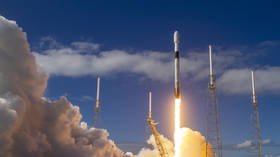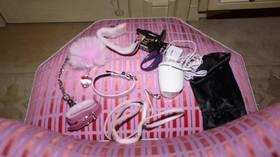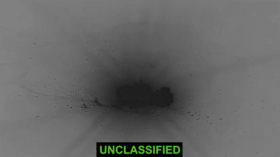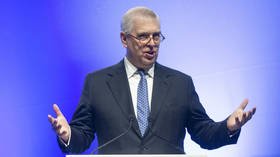'Man who polluted heavens': Astronomers furious over Musk's Starlink satellites clouding their vision

SpaceX CEO Elon Musk seeks to make the world happy with his Starlink project providing satellite Internet access. So far, he only managed to make astronomers across the world upset by rendering their telescopes blind.
The billionaire who also positions himself as philanthropist and innovator has recently set himself a goal of bringing high speed internet to the most remote corners of the earth with a network of thousands of small satellites he plans to put on the low-earth orbit. The ambitious plan involves sending a whopping 12,000 devices into space to form a satellite constellation as part of the project Starlink.
That is not the final number, though, as SpaceX has entered into negotiations with the International Telecommunication Union (ITU) reportedly seeking to get permission to fly another 30,000 Starlink satellites, bringing their total number to 42,000. That is roughly 20 times more than the number of operational satellites currently in orbit.
Also on rt.com ESA satellite forced into ‘first ever’ emergency maneuver to avoid crash with SpaceX constellationThe practical benefits of this project are not yet evident as Musk has so far only managed to send about 120 Starlink satellites into space – a handful compared to his ambitious plans. However, it was enough to unnerve astronomers around the globe, who now argue the billionaire threatens the existence of astronomy itself.
Successful deployment of 60 Starlink satellites confirmed! pic.twitter.com/bpBqO9oYR3
— SpaceX (@SpaceX) November 11, 2019
A day after the first set of 60 Starlink satellites blasted off into orbit on May 23, astronomers sounded the alarm, warning that they could interfere with ground based astronomy as they would blind telescopes due to their brightness.
Six months later, when the second batch of Starlink satellites got into orbit as well, the scientists realized that their worst fears came true. On Monday, Clarae Martinez-Vazquez, an astronomer at the Cerro Tololo Inter-American Observatory (CTIO) in Chile alerted her colleagues that a train of just 19 Starlink satellites has “heavily affected” the work of its highly-sensitive Dark Energy Camera (DECam), tasked with no less than helping humans to unravel the mysterious nature of ‘dark energy.’
Wow!! I am in shock!! The huge amount of Starlink satellites crossed our skies tonight at @cerrotololo. Our DECam exposure was heavily affected by 19 of them! The train of Starlink satellites lasted for over 5 minutes!! Rather depressing… This is not cool! pic.twitter.com/gK0ekbpLJe
— Clarae Martínez-Vázquez (@89Marvaz) November 18, 2019
Yet, for about five minutes the instrument was rendered completely useless – all thanks to Musk's project, even though it is at a very early stage.
Here’s the Starlink plagued DECam frame: #FieldOfSatTrailspic.twitter.com/TyFSJO9LKR
— Cliff Johnson (@lcjohnso) November 18, 2019
The news immediately prompted outrage among fellow astronomers, who turned to Twitter to vent their frustration. Some of them said their future work would now involve a lot of additional data processing, while others warned that such incidents would turn into “everyday occurrences” as Musk carried on with his plan.
Wow :( This is really not cool for ground based astronomy. I guess we'll have to get used to LOTS of additional data processing to remove satellite trails.... https://t.co/Lqmq9nzwws
— Matthew Kenworthy (@mattkenworthy) November 18, 2019
Professional astronomers starting to be affected by Starlink. This kind of problem will be rare for now, but once the full constell is up it will be an everyday occurrence. https://t.co/CkS50Fpzpw
— Jonathan McDowell (@planet4589) November 18, 2019
The most frustrated ones were quick to label the billionaire “the man who polluted the heavens,” adding that it would be his “lasting environmental legacy.”
I'm sure Musk imagines himself some sort of environmental hero for selling electric cars, but his true, lasting environmental legacy will be as the man who polluted the heavens.
— Simon Porter (@AscendingNode) November 18, 2019
SpaceX promised to paint its satellites black to make them less reflective, although it did not apparently do so with the batch it sent into space on November 11. Besides, some scientists are skeptical about this plan because they say many telescopes would be able to “see” the devices even after this measure is taken. Apart from that, painting would hardly affect the satellites’ radio waves, which interfere with the telescopes just as well.
But being an all-round good guy, Musk apparently could not be bothered about this fact. Confronted by the astronomers, he simply suggested moving the “telescopes to orbit,” sparking another wave of indignation.
There are already 4900 satellites in orbit, which people notice ~0% of the time. Starlink won’t be seen by anyone unless looking very carefully & will have ~0% impact on advancements in astronomy. We need to move telelscopes to orbit anyway. Atmospheric attenuation is terrible. pic.twitter.com/OuWYfNmw0D
— Elon Musk (@elonmusk) May 27, 2019
Some called him an amateur, while others even compared him to French Queen Marie Antoinette, who reportedly infamously said that the peasants should simply “eat cake” upon finding out they had no bread, not long before the monarchy was overthrown during the French Revolution.
As for your question, the first step would be for space companies to accept that we're the experts here. Launching satellites into space doesn't make one an astronomer, much like injecting CO2 in the atmosphere doesn't make one a climate scientist.
— Juan Carlos Munoz (@astro_jcm) November 18, 2019
"We need to move telelscopes to orbit anyway" is the "let them eat cake" of astronomy. It demonstrates profound ignorance and arrogance, but is a good opportunity for education. A thread! https://t.co/jerZNclvb4
— Andy Howell (@d_a_howell) May 29, 2019
Musk, however, is unlikely to suffer a fate similar to that of Marie Antoinette, as, according to the legal experts, the law is basically on his side. Or, rather, it does not have any provisions that could stop SpaceX from developing its project simply because it threatens existing and future astronomical infrastructure.
The future of the Starlink project appears to be looking quite bright so far. What this brightness would mean for astronomy is another matter entirely.
Like this story? Share it with a friend!













